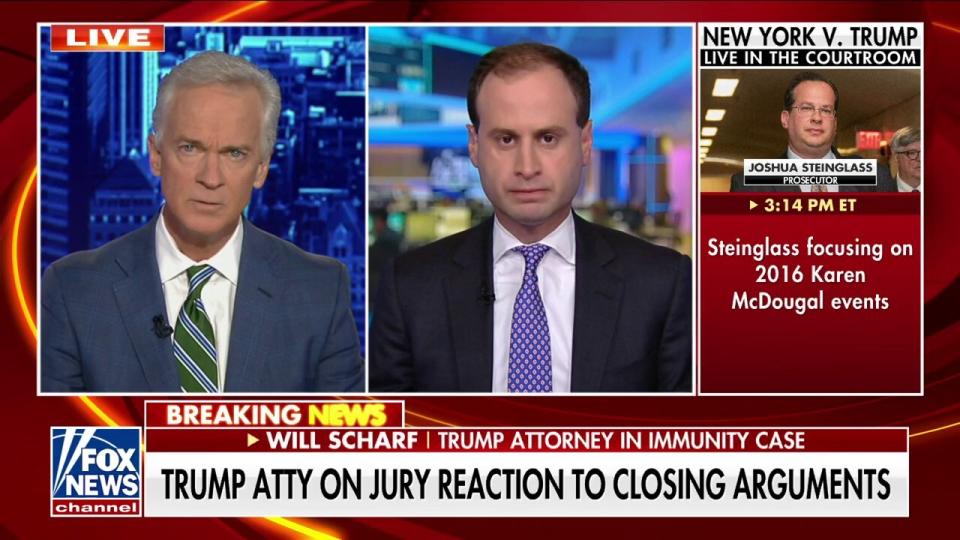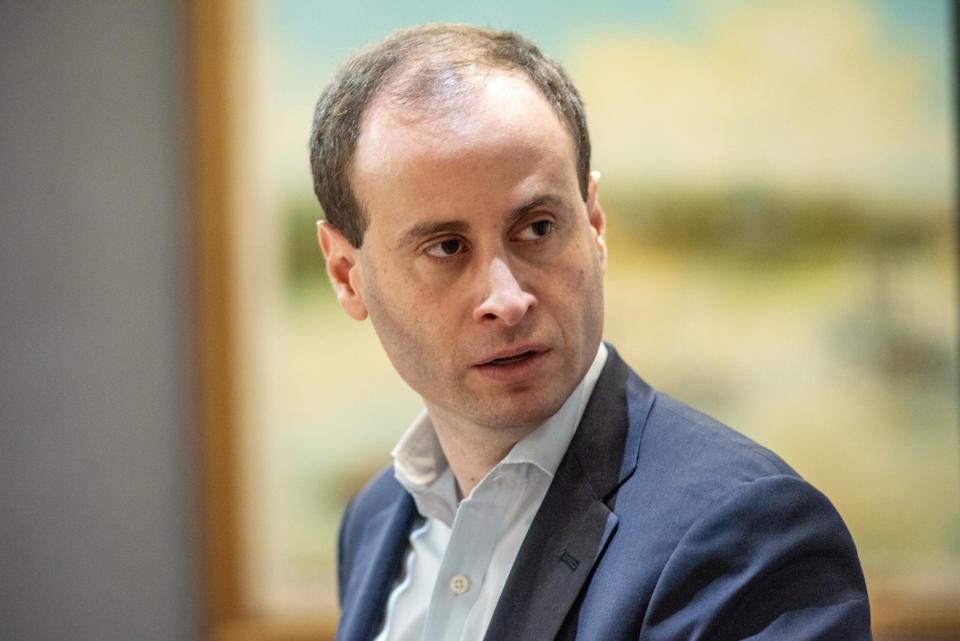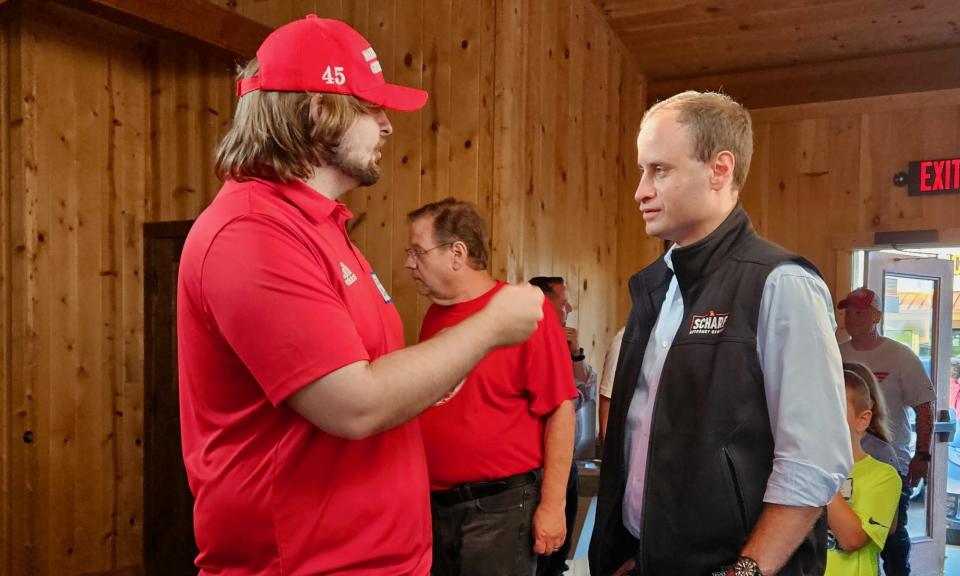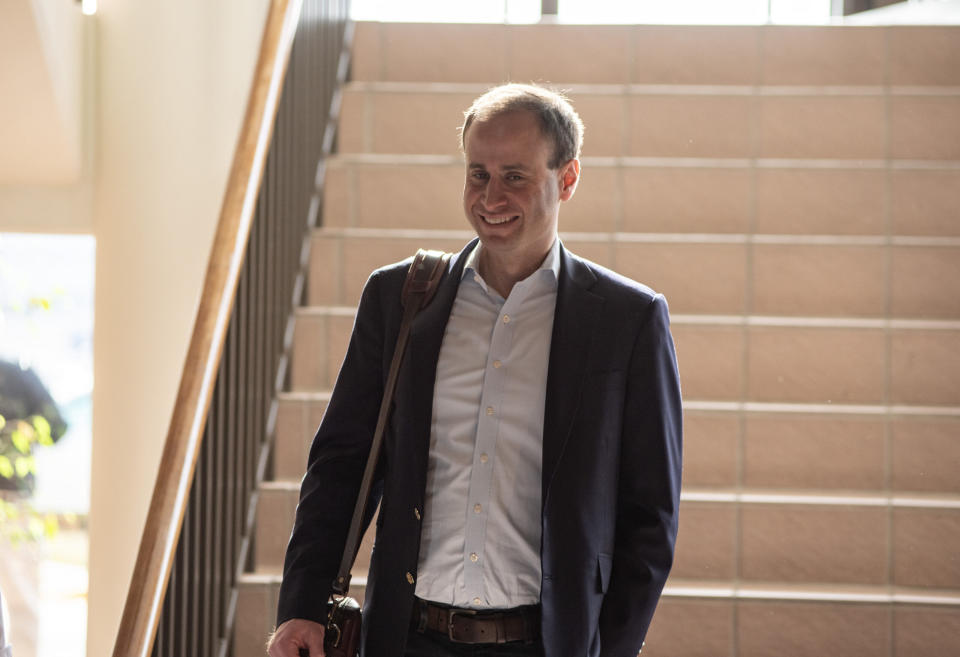‘Trump’s lawyer’ Will Scharf pegs bid for Missouri AG on alleged Jeff City corruption
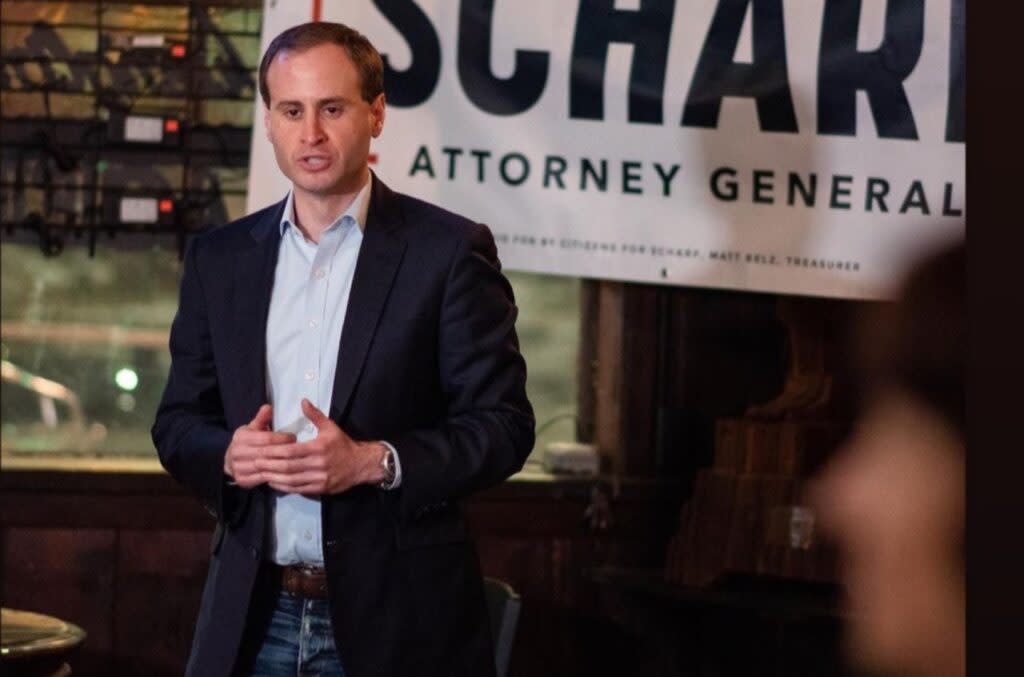
- Oops!Something went wrong.Please try again later.
- Oops!Something went wrong.Please try again later.
Will Scharf at his campaign kickoff event on Jan. 31, 2023, in St. Louis (photo submitted).
It was late August last year when Will Scharf got a call from a South Florida number he didn’t recognize.
“It was a 561 number, and my parents are in that area code,” Scharf said. “So I assumed it was my dad calling me from a landline or something.”
As it turns out, it was Donald Trump.
Scharf had become close with a number of attorneys in Trump’s orbit, and had been making regular media appearances defending the former president as he faced a litany of criminal charges.
“I’d spoken to him before, but never, you know, him calling me from his cell phone. I picked up, and it was just him,” Scharf recalled in an interview with The Independent. “His legal team was looking to bring on a dedicated appellate team, and the president just called me and asked me if that was something that I was interested in.”
Scharf and a pair of other Missouri lawyers — John Sauer and Michael Talent — “pitched the (Trump) campaign the way you would pitch any client, and a couple days later, they hired us. And we’ve been working for the president ever since.”
His role as one of Trump’s lawyers has become a key selling point as he seeks to oust incumbent Missouri Attorney General Andrew Bailey in the Aug. 6 Republican primary. During a recent campaign event in Springfield, his work for Trump — and his full-throated defense of the former president’s record — made up the lion’s share of Scharf’s speech.
His campaign mailers feature Trump’s image and news reports about Scharf’s role helping win the presidential immunity case in the U.S. Supreme Court.
But Scharf is also running against Jefferson City itself, painting state government as hopelessly corrupt and in the thrall of special interests. And Bailey, who was appointed to the job by Gov. Mike Parson in 2022, is front and center of the corruption, Scharf contends.
“Jefferson City is an abysmal failure, and if we keep putting the same people back in charge, we’re going to keep getting more of the same,” Scharf said.
To his critics, however, Scharf’s rhetoric is pure hypocrisy.
His bid for attorney general is being bankrolled by out of state billionaires, most notably groups associated with Leonard Leo of the Federalist Society. And Scharf’s only foray into state government thus far, critics note, was working for former Gov. Eric Greitens, who was forced to resign from office in 2018 to avoid impeachment and settle a felony charge.
Bailey and his supporters have also pilloried Scharf over the fact that he was born in New York and is an Ivy League alumni of Princeton and Harvard.
“Wall Street Willie is backed by D.C., dark money groups and a Wall Street billionaire, and (he) has no real ties to the State of Missouri,” Bailey said in an interview with The Independent.
Scharf said Bailey’s attacks are a sign of desperation.
“The crux of the issue is that they can’t attack my record as a conservative,” he said. “They can’t attack my courtroom successes, and they can’t attack my experience. So they basically attack me for where I was born, which I obviously had no control over. And they think that’ll stick. I don’t think it’s going to fool Missouri voters. I’m proud to be a Missourian by choice.”
Journey to Missouri
Scharf was indeed born in New York, eventually attending the Phillips Academy preparatory school in Andover, Massachusetts, where he graduated in 2004. He went on to graduate from Princeton University and Harvard Law School.
At Harvard, Scharf became president of the university’s chapter of the Federalist Society, the influential conservative legal advocacy group involved in almost every high-profile conservative judicial appointment of recent decades.
He moved to Missouri after law school in 2011 to clerk for Appeals Court Judge Raymond Gruender, who was appointed to the bench by former President George W. Bush and would later be included on Trump’s short list for the U.S. Supreme Court.
“Within a few months of moving here, I just liked Missouri a lot better than any place I’ve lived before,” he said. “And I decided pretty quickly that this is where I wanted to make my own home.”
It didn’t hurt, Scharf notes, that his arrival in the fall of 2011 coincided with the St. Louis Cardinals’ run to a World Series.
“I was working downtown, and they were, like, 11 games back in the NL Central. So I’d walk over after work and get a cheap seat in the bleachers,” he said. “That was really my introduction to St. Louis and the culture. It drew me in almost immediately.”
He eventually settled into private practice, but was lured into politics when Catherine Hawnaway decided to run for governor in 2016. He volunteered for the campaign, and ended up joining full time. When she lost in the GOP primary, the man that won the nomination — Eric Greitens — asked him to join his team.
“I’d been a thorn in his side during the primary,” Scharf said, “and he thought I could do as good a job for him as I had done against him.”
Greitens would go on to win that fall, and Scharf was named policy director in the governor’s office.
John Lamping, a former Republican state senator who became close with Scharf over the years, said regardless of the scandals that marred Greitens’ personal life and led to his downfall, the policy wins for conservatives during his time as governor can’t be denied.
Greitens signed a right to work law, though it was ultimately overturned by a union-organized referendum campaign. He convened a special session to pass anti-abortion legislation. And he derailed the state’s low-income housing tax credit program that he believed was a giveaway to wealthy developers.
And Scharf, Lamping said, was a key reason why.
“His influence on Gov. Greitens was specific to policy and the possibility of achieving the legislative successes that Greitens wanted to achieve,” Lamping said. “And on that note, especially with primary voters, his grade would be A+.”
After Greitens’ resignation, Scharf moved to Washington, D.C., to work for the advocacy organization Judicial Crisis Network, focused on judicial confirmations and nominations, most notably Justice Brett Kavanaugh.
In 2020, he jumped at the chance to return to Missouri to work as an assistant U.S. attorney in St. Louis.
“I wanted to get back to Missouri,” he said. “And I always wanted to be a prosecutor.”
Two years later, when then-Attorney General Eric Schmitt was getting ready to resign to take a seat in the U.S. Senate, Scharf was among the Republicans quietly working behind the scenes to convince the governor to appoint him as a replacement.
Parson tapped Bailey instead, and Scharf says he began being approached by friends to run for the office.
“I thought about it, I prayed on it, I talked to friends about it,” Scharf said, then formally launched his challenge of Bailey in January 2023.
Culture of corruption
There is a “deep dissatisfaction with Jefferson City,” Scharf said.
“Everywhere we’ve gone in the state during the campaign,” he said, “people are ready for a change.”
One of Scharf’s main lines of attack has been Bailey taking donations from lobbyists and companies whose interests intersect with the attorney general’s office.
For example, last year the attorney general had to recuse his office from litigation filed by companies accused of operating illegal gambling devices, forcing the state to hire private counsel. The recusal came after Bailey received thousands in contributions from PACs connected to the chief lobbyist for the companies suing the state.
Bailey also drew fire over accepting a $50,000 donation from a St. Louis company shortly after filing an amicus brief backing its efforts to move a lead-poisoning lawsuit it was facing out of Missouri.
“When you look at Jefferson City today,” Scharf said, “you see a political culture that’s deeply in hock to a very narrow set of special interests and lobbyists and political insiders.”
Scharf vows to use the power of attorney general’s office to root out corruption in state government.
“The power brokers that control most of the elected offices in Jeff City, he’s not part of that,” Lamping said of Scharf. “The people that run Jeff City, they better be very careful, because I think that they’ll have somebody paying a lot of attention to them if Will Scharf is elected.”
Bailey vehemently denies any wrongdoing, arguing Scharf’s entire message is undercut by his association with Greitens.
Greitens’ successful 2016 campaign was, like Scharf’s, also pegged on the notion that Jefferson City was hopelessly corrupt and could only be fixed by electing a political outsider.
But his administration was plagued with accusations of impropriety, mostly stemming from the fountain of anonymous campaign contributions that fueled his political rise. Greitens’ campaign committee would eventually be hit with one of the largest fines in the history of the Missouri Ethics Commission.
Adding to the drama were the scandals emanating from Greitens’ personal life, including allegations of violent sexual assault that fueled the push for a GOP-dominated General Assembly to impeach him.
He avoided being removed from office when he resigned in June 2018 to settle a felony charge in St. Louis surrounding his alleged theft of a donor list from a veterans charity he founded.
“It shows a real lack of integrity on his part,” Bailey said of Scharf’s work with Greitens.
Scharf said he was only involved in policy during his time with Greitens, “and I’m proud of our policy accomplishments.”
“Eric Greitens was not the first person to note that our political culture in Jefferson City is broken,” Scharf said, “and he’s obviously not the last.”
Bailey has also panned the millions in donations that have poured into the PAC supporting Scharf from groups tied to Leonard Leo of the Federalist Society. So far, Scharf has benefited from $3.5 million in donations connected to Leo.
According to The New York Times, Leo has helped marshal half a billion dollars in resources over the last decade to bankroll legal, policy and political fights around the country over issues ranging from critical race theory to transgender rights to election law.
Scharf has publicly called Leo “a dear friend and mentor.”
Lamping said taking money from someone who has “helped create the most conservative Supreme Court in our lifetimes is a pro, not a con.”
Break from the past
In addition to focusing on government corruption, Scharf vows to go after companies behind games that resemble slot machines that have sprung up in convenience stores, truck stops and other locations across the state in recent years.
The Missouri Gaming Commission has deemed the machines gambling devices, which are prohibited outside of licensed casinos, and the state highway patrol considers them illegal.
Bailey has said the issue should be handled at the local level. Scharf vehemently disagrees.
“The AGs office has broad authority to enforce Missouri gaming law,” Scharf contends, “and I think they’re not currently exercising that authority. The machines are illegal. The law needs to be enforced. It’s as simple as that.”
He also promises to stabilize an office he says has suffered massive staff turnover since Bailey took over — a problem he argues has led to “cases, including low level cases that should be handled easily by the office being farmed out to private counsel.”
Just this week, for example, a judge dismissed a lawsuit filed by the attorney general’s office against a solar company accused of ripping off customers by knowingly using defective components and refusing to repair or properly install their systems. The reason for the dismissal was that no one from the attorney general’s office showed up at a hearing on Tuesday.
“They’ve missed deadlines in numerous cases around the state,” Scharf said of Bailey’s office. “They’ve even been called to task for that by judges in any number of cases. It’s a real problem, the basic functioning of that office has been compromised by poor management.”
With Scharf’s background and ties to national conservative legal circles, Lamping expects Missouri’s attorney general’s office to be a hot landing spot for some of the nation’s best lawyers.
“You will see extraordinary legal minds from all around the country come in,” he said, “and spend some time working under a Scharf attorney general’s office.”
Ultimately, Scharf’s pitch for the job comes down to what voters think about their state government.
“If you’re really happy with the Jefferson City establishment, our campaign is probably not right for you,” he said. “If you want a break from the past, if you want a government in Jefferson City that’s actually focused on representing the interests of the people of Missouri, I think you should give us a strong look.”
And to avoid any more confusion when the former president calls him, Scharf came up with a solution.
“Now I have a special ring that goes off when he calls me,” Scharf said. “The only number in my phone that results in an audible ring is President Trump. Everyone else, I just have the buzzer.”
The post ‘Trump’s lawyer’ Will Scharf pegs bid for Missouri AG on alleged Jeff City corruption appeared first on Missouri Independent.
